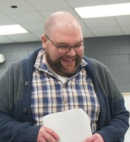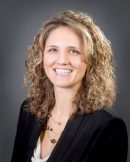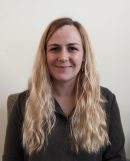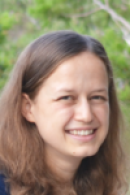Lauren Brooks is currently a Teaching Assistant Professor at North Carolina State University. Dr. Brooks received her PhD in German Studies from the Pennsylvania State University in 2018 with a dissertation titled, “Kafka goes to New York: Reading Kafka in Seinfeld’s America.” Her research focuses on the Kafka’s absurdist treatment of authority and respect across his corpus by analyzing his humor through the U.S. situation comedy Seinfeld. For the past nine years, she has taught a range of German language curriculum from Novice to Advanced, including writing-intensive, conversation, and literature and cultural studies courses. Dr. Brooks also spent close to seven years working and living in the city of Bremen, Germany. She loves to talk about her experiences in Bremen, so when you see her, ask her about her time there! Dr. Brooks enjoys cooking, traveling, and playing with her three cats. In her free time, she also runs and teaches LesMills group fitness classes. Fun Fact: Dr. Brooks starred in a German reality cooking show titled Das perfekte Dinner. There are so many things one can do with a foreign language!
Josh Brown (PhD, German and Linguistics, 2011) is a Professor of German at the University of Wisconsin-Eau Claire. He researches heritage languages in the United States and has authored articles on the Amish, Hutterites, and Somali refugees. In addition, he has published articles on proficiency and assessment for language learning classrooms. With Simon Bronner, he co-edited Pennsylvania German Studies: An Interpretive Encyclopedia (Johns Hopkins University Press). In 2014, Brown received the German Embassy Teacher of Excellence Award from the American Association of Teachers of German. He has been Joseph Horner Fellow at the German Historical Institute and Kreider Fellow at Elizabethtown College. He serves as editor of H-Transnational German Studies at Michigan State University and newsletter editor for the Society for German-American Studies. Brown is currently on the board of directors for the Friends of the Max Kade Institute at UW-Madison. His professional website is: https://www.joshuarbrown.com/
Dr. Brust’s current research project Reunification versus Reconciliation examines the role of literature and film in developing alternative public spheres in post-wall Germany and post-apartheid South Africa. Her scholarly essays engage issues of gender and race, and investigate the images of, and the tensions between, nation and state in contemporary literature, film, and visual culture.
Dr. Brust’s research and teaching interests focus on 20th and 21st German literature, film, and theater, nationalism, (post-) colonialism, globalization, European and African Studies.
Alison Eisel Hendricks completed her PhD in 2014 and is currently an assistant professor in the Department of Communicative Disorders and Sciences at the University at Buffalo. Prior to her current position she was a postdoctoral fellow in the Department of Communication Sciences and Disorders at the University of South Carolina. Dr. Hendricks’ directs the UB Language Learning Lab (BuffaLLLo) which conducts research on language acquisition in school-age children with and without language impairments such as Developmental Language Disorder. Dr. Hendricks’ research focuses on how children learn language from the input they hear, with a particular focus on how children who are exposed to different quantities and types of input acquire language. One line of research focuses on how bilingual children with language impairments acquire language. A second line of research focuses on acquisition of morphosyntax by children who hear Non-mainstream American English dialects, such as African American English. The goal of this research is to better understand the underlying process of language acquisition as well as to improve the identification of Developmental Language Disorder in children who speak Non-mainstream dialects.
After graduating in 2015, Nick joined the Baylor faculty as a Lecturer in German, where he taught in the German and Linguistics programs. In August 2018, he joined the faculty of the University of Texas at Austin as an Assistant Professor of Second Language Studies in the Department of Germanic Studies. He teaches German and Linguistics courses at the undergraduate and graduate levels and heads the Second Language Acquisition and Bilingualism Lab. His primary research focus is the interaction between second language pedagogy and sentence processing. This research centers on describing how learners process sentences and understanding the effectiveness of psycholinguistically motivated instructional techniques. He has most recently conducted studies on the acquisition of the accusative case in German, the effects of prosody in the development of a second language grammar, the acquisition of grammatical gender, and the effectiveness of Processing Instruction.
Hyoun-A Joo is currently an Assistant Professor of German at Georgia Tech. She completed her Magister Artium degree in German literature and a teaching certification for German as a foreign language at the Freie Universität Berlin, Germany. Dr. Joo taught German in Seoul, South Korea, and Berlin before coming to the U.S. for her doctorate degree. She earned her Ph.D. at the Pennsylvania State University in German Applied Linguistics and Language Science.
For her dissertation, she interviewed first generation Korean immigrants in Germany to learn more about how they came to (former West) Germany and how they acquired German. The particular linguistic phenomenon she investigated was the acquisition of the asymmetric verb placement in German. Dr. Joo is interested in further exploring the intersection between language acquisition, migration, and identity.
Katherine Kerschen is a Lecturer and Pedagogy Specialist in the Department of Germanic Languages and Literatures at Washington University in St Louis. Her research focuses on second language learners’ lexical knowledge and the process of vocabulary acquisition in a second language, and also on the impact of instructional methods on adult second language acquisition, generally. Her dissertation research investigated the impact of semantic feature-focused and retrieval-based training activities on intermediate German learners’ productive vocabulary knowledge. She has also published on innovative pedagogical methods such as project-based learning and social justice pedagogy. While at PSU, she not only had the chance to develop research collaborations across various disciplines of language science, but also gained additional professional skills through working as an assistant in the Center for Language Science, mentoring undergraduate RAs, and designing courses. She puts these skills to use in her current position to train graduate student teaching assistants and work on curriculum development focused on antiracist, equitable, and inclusive approaches in the second language classroom.
Ines Martin is Assistant Professor of German in the Languages and Cultures Department. Her research in the field of Applied Linguistics addresses the gap between second language research findings and foreign language teaching practice with the goal to facilitate instructed Second Language Acquisition for both learners and instructors. As part of her research agenda, Dr. Martin has developed a computer-assisted method of pronunciation instruction that allows on-campus learners—but also distance or online students—to improve their pronunciation of German. Her current research focuses on the role of internal and external motivation in improving language learners’ pronunciation and explores whether peer-feedback on pronunciation is beneficial in foreign language classrooms. To support her scholarly work, Dr. Martin has received several grants (e.g., a Max Kade Fellowship or a Language Learning Dissertation Support Grant) and her research findings have been published in leading refereed journals in her field (e.g., Foreign Language Annals).
Janice completed her PhD in German Applied Linguistics at Penn State in 2012. From 2012-2018, Janice worked as an assistant professor of German at Kansas State University, serving as German language program coordinator and teaching in the MA in Second Language Acquisition. Starting Fall 2018, Janice joins the Department of German Studies at the University of Arizona as an assistant professor of German, where she’ll teach undergraduate and MA courses in German as well as graduate courses in the Joint PhD in Transcultural Studies and the interdisciplinary PhD program in Second Language Acquisition and Teaching (SLAT).
In her research, Janice examines language and intercultural learning by taking an interactionally grounded approach to the examination of how learners, teachers, and researchers deploy their multilingual resources in interaction with others, especially in contexts of study abroad. She is also interested in how they collaboratively negotiate their identities and beliefs about language learning/teaching in interaction.
Nicole McInteer, Associate Dean for Admissions at Wake Forest University, successfully defended her dissertation titled: “Writing the Edge of Empire: Joseph Roth’s Galicia” on October 10 2016. The dissertation compares Roth’s famous novel Radetzkymarsch with other ethnographic and historical writings on the Austrian province of Galicia, such as the Kronprinzenwerk and works by Leopold von Sacher-Masoch and Karl Emil Franzos.
Maike Rocker is a Lecturer and Coordinator of the basic language program at the Ohio State University. In this capacity, she mentors Graduate Teaching Assistants in becoming effective foreign language teachers and . Her Master’s in Education from the University of Bremen as well as teaching German at the University of Waterloo (Canada), at SUNY Binghamton, and at PennState provided her with much theoretical knowledge and practical experience in second language acquisition.
Maike’s research focuses on language contact in Germanic heritage speaker communities and the effects of multilingualism on variation in morphosyntactic structures, socioculturaldevelopment, and identity construction. Her dissertation analyzed language shift and language change in a Low German–speaking community in Iowa, finding that the increased use of verb-third constructions follows predictable patterns and is not due to individual attrition effects. She has also presented and published on progressive constructions in Pennsylvania Dutch and the sociolinguistic development of a little-known German-Jewish settlement in Sosúa (Dominican Republic).
I grew up in East Germany (when it was still the German Democratic Republic) and earned a teaching certification for Secondary Education for German and English from the Otto-von-Guericke-University Magdeburg (Germany) in 2008. After that, I spent 18 months teaching German to students at Texas Tech University, while also getting a Master in German and a Minor in Linguistics. I enjoyed English-speaking academia and teaching college-age students and decided to get my PhD at the Pennsylvania State University in 2015 with my dissertation “The Concert Hall as Heterotopia: Sounds and Sights of Resistance in the Leipzig Gewandhaus 1970-1989.” I also received the Harold F. Martin Graduate Assistant Outstanding Teaching Award at Penn State. From then on, I kept spending my time with questions of artistic expressions of social change, musical engagement with socio-political issues, and the reception history of art in the GDR. My interdisciplinary research focuses on East German music, architecture, and the fine arts during the 1970s and 1980s. I have published on works of the band Rammstein, contemporary HipHop artists, and Gustav Mahler, and have been working on projects about the Gewandhaus in Leipzig, the reception of Mahler in East Germany, and Rammstein’s new song “Deutschland.” My next project will move from classical to popular music and trace the work of female rock musicians in the GDR.
Before joining Yale’s German Department in 2018, Liese Sippel taught all levels of German language classes at New York University, The Pennsylvania State University, Middlebury College, and the Goethe-Institut. Her research interests include instructed second language acquisition and foreign language pedagogy.
Nina Vyatkina graduated with a PhD in German, Applied Linguistics option, in 2007 and immediately started working as an Assistant Professor in the Department of Germanic Languages and Literatures at the University of Kansas. She was promoted to Associate Professor in 2013 and to Professor beginning August 2018. She has also been serving as department chair since 2016. She has taught a variety of graduate and undergraduate German and Applied Linguistics courses and directed several dissertations. Prof. Vyatkina’s research interests include instructed second language acquisition, corpus-based language learning and teaching, and learner corpus research. Her articles on these topics have appeared in leading Applied Linguistics journals. She is a co-recipient of the 2009 Paul Pimsleur Award for Research in Foreign Language Education. She serves on the Executive Board of the Computer-Assisted Language Instruction Consortium (CALICO) and the Editorial Boards of Language Learning & Technology and International Journal of Learner Corpus Research. Prof. Vyatkina gave twelve invited talks in seven countries beyond the US, and she has been collaborating on international projects with German scholars from the University of Tübingen and Humboldt-University in Berlin, where she spent the 2014 fall semester as a U.S. Fulbright scholar.













